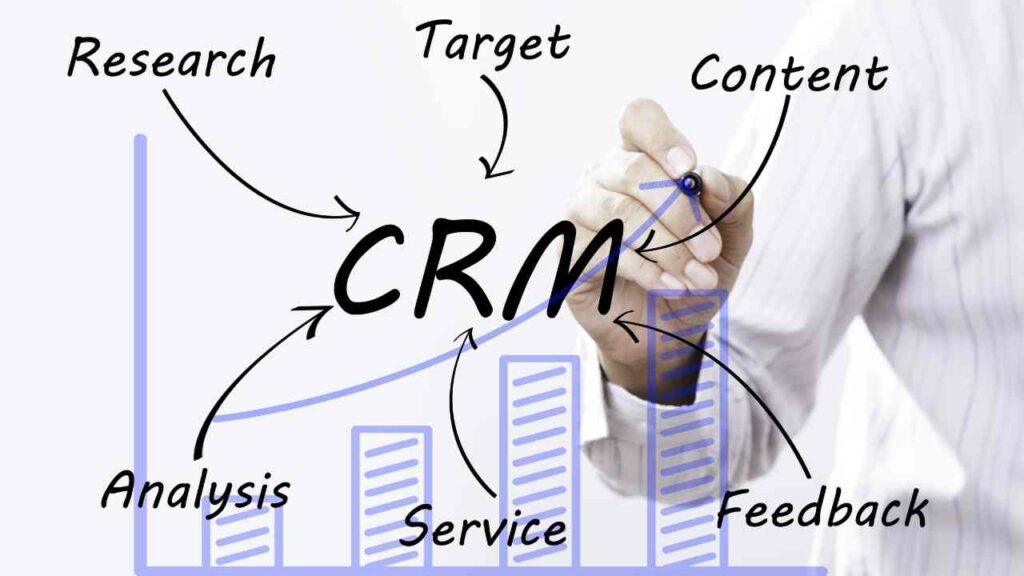Implementing CRM for Contact Management

Customer Relationship Management
Managing contacts is a crucial aspect of any business, regardless of its size or industry. Building and maintaining strong relationships with customers and prospects is essential for long-term success. However, as the number of contacts grows, it becomes increasingly challenging to keep track of all interactions and ensure that no opportunities slip through the cracks. This is where Customer Relationship Management (CRM) systems come into play. In this article, we will explore the benefits of implementing CRM for contact management and provide valuable insights on how to make the most out of this powerful tool.
The Importance of Contact Management
Before diving into the specifics of CRM systems, it is important to understand why effective contact management is crucial for businesses. Here are a few key reasons:
- Improved customer relationships: By keeping track of all interactions with customers and prospects, businesses can provide personalized and timely support, leading to stronger relationships and increased customer satisfaction.
- Increased sales opportunities: Proper contact management allows businesses to identify and nurture potential leads, ensuring that no sales opportunities are missed.
- Streamlined communication: With a centralized contact management system, businesses can ensure that all team members have access to up-to-date contact information, eliminating the risk of miscommunication or duplicate efforts.
- Efficient marketing campaigns: By segmenting contacts based on various criteria, businesses can tailor their marketing campaigns to specific target audiences, resulting in higher engagement and conversion rates.
The Role of CRM in Contact Management
A CRM system serves as a centralized hub for managing all customer and prospect information. It allows businesses to store, organize, and analyze contact data, providing a comprehensive view of each individual’s interactions with the company. Here are some key features and benefits of implementing CRM for contact management:
1. Centralized Contact Database
A CRM system provides a single source of truth for all contact information. Instead of scattered spreadsheets or disjointed email threads, businesses can store and access all contact details in one place. This ensures that everyone in the organization has access to the most up-to-date information, eliminating the risk of outdated or conflicting data.
2. Contact Segmentation
CRM systems allow businesses to segment contacts based on various criteria, such as demographics, purchase history, or engagement level. This segmentation enables targeted marketing campaigns and personalized communication, resulting in higher conversion rates and customer satisfaction.
3. Activity Tracking
With a CRM system, businesses can track all interactions with contacts, including emails, phone calls, meetings, and social media interactions. This comprehensive activity tracking provides valuable insights into each contact’s engagement level and helps identify the most effective communication channels.
4. Task and Reminder Management
CRM systems often include task and reminder management features, allowing businesses to schedule follow-ups, set deadlines, and assign tasks to team members. This ensures that no opportunities are missed and that all interactions are timely and well-coordinated.
5. Integration with Other Tools
Many CRM systems offer integrations with other business tools, such as email marketing platforms, customer support software, and project management tools. These integrations streamline workflows and eliminate the need for manual data entry, saving time and reducing the risk of errors.
Best Practices for Implementing CRM for Contact Management
Implementing a CRM system for contact management is a significant undertaking that requires careful planning and execution. Here are some best practices to ensure a successful implementation:
1. Define Your Objectives
Before selecting a CRM system, clearly define your objectives and what you hope to achieve with contact management. Are you primarily focused on improving customer relationships, increasing sales, or streamlining communication? Understanding your goals will help you choose a CRM system that aligns with your specific needs.
2. Choose the Right CRM System
There are numerous CRM systems available in the market, each with its own set of features and pricing plans. Take the time to research and evaluate different options, considering factors such as ease of use, scalability, integration capabilities, and customer support. It is also important to involve key stakeholders in the decision-making process to ensure buy-in and adoption.
3. Clean and Import Your Data
Prior to implementing a CRM system, it is essential to clean and organize your existing contact data. Remove any duplicates, outdated information, or irrelevant contacts. Once your data is clean, import it into the CRM system, ensuring that all fields are mapped correctly. This initial data migration is a critical step to ensure a smooth transition to the new system.
4. Provide Training and Support
Introducing a new CRM system to your team requires proper training and ongoing support. Provide comprehensive training sessions to familiarize users with the system’s features and functionalities. Additionally, designate a point person or a dedicated support team to address any questions or issues that may arise during the implementation process.
5. Encourage User Adoption
A CRM system is only effective if it is actively used by all team members. Encourage user adoption by highlighting the benefits of the system and demonstrating how it can streamline workflows and improve productivity. Consider implementing incentives or gamification strategies to motivate employees to embrace the new system.
Case Study: XYZ Company
To illustrate the benefits of implementing CRM for contact management, let’s take a look at a real-life example. XYZ Company, a small e-commerce business, decided to implement a CRM system to streamline their contact management processes and improve customer relationships.
Prior to implementing the CRM system, XYZ Company relied on spreadsheets and manual data entry to manage their contacts. This led to inefficiencies, as team members often had outdated or conflicting information. Additionally, there was no systematic way to track customer interactions or segment contacts for targeted marketing campaigns.
After implementing the CRM system, XYZ Company experienced several significant improvements:
- Centralized contact database: All contact information was stored in one place, ensuring that everyone had access to the most up-to-date data.
- Improved customer relationships: With a comprehensive view of each customer’s interactions, XYZ Company was able to provide personalized and timely support, resulting in increased customer satisfaction.
- Increased sales opportunities: The CRM system allowed XYZ Company to identify potential leads and track their progress through the sales pipeline, ensuring that no opportunities were missed.
- Efficient marketing campaigns: By segmenting contacts based on purchase history and engagement level, XYZ Company was able to tailor their marketing campaigns and achieve higher conversion rates.
Overall, the implementation of the CRM system transformed XYZ Company’s contact management processes, leading to improved efficiency, stronger customer relationships, and increased sales.
Implementing a CRM system for contact management is a strategic decision that can have a significant impact on a business’s success. By centralizing contact information, segmenting contacts, tracking activities, and integrating with other tools, businesses can streamline communication, improve customer relationships, and increase sales opportunities. However, successful implementation requires careful planning, choosing the right CRM system, cleaning and importing data, providing training and support, and encouraging user adoption. By following these best practices and learning from real-life case studies, businesses can harness the power of CRM for effective contact management.
Ready to take your contact management to the next level? Check out SaasExpert.ca – Your All-In-One Sales and Marketing Platform for small businesses, agency owners, and marketers.
Learn more about “Optimizing Contact Management with CRM” right here.
Frequently asked questions about Implementing CRM for Contact Management.

How does implementing CRM enhance the overall customer experience strategy? 🌟
Implementing a CRM (Customer Relationship Management) system is a pivotal step in enhancing a company’s customer experience strategy. CRM goes beyond just managing contacts; it implements processes to track, oversee, and orchestrate all customer interactions. This ensures that businesses have a 360-degree view of their customers, allowing them to tailor their services, products, and communications to meet individual needs and preferences. The result? Happier customers and stronger relationships! 😊
What benefits can businesses expect from contact management software? 📑
Contact management software, often a core feature of CRM systems, offers a plethora of benefits. It allows businesses to manage their contacts efficiently, streamline communication, and enhance customer relationship management. By having a centralized system, businesses can ensure that all customer interactions, from inquiries to purchases, are recorded. This leads to better communication, timely follow-ups, and a more personalized approach to customer service. Plus, with the ability to analyze contact data, businesses can identify trends and make informed decisions. 🚀
How does CRM integration with other tools impact contact management in the hotel industry? 🏨
In the hotel industry, integrating CRM with other tools, such as booking systems or feedback platforms, can revolutionize contact management. It ensures that guest preferences, booking history, and feedback are all stored in one place. This allows hotels to offer personalized services, send targeted promotions, and address any concerns promptly. By having a holistic view of each guest, hotels can enhance the guest experience, leading to repeat bookings and positive reviews. 🌟
Why is first-party data tracking in CRM crucial for B2B contact management? 🏢
First-party data, which is data collected directly from interactions with businesses or their websites, is invaluable for B2B contact management. CRM systems that effectively track this data provide insights into the preferences, behaviors, and needs of business clients. By leveraging this data, B2B companies can tailor their offerings, communications, and services to meet the specific needs of each client. This not only enhances the client relationship but also drives business growth and opportunities. 💼
How does CRM automation streamline the contact management process? 🤖
CRM automation is a game-changer for contact management. It can automate various tasks, such as updating contact details, setting reminders for follow-ups, or segmenting contacts based on specific criteria. This reduces manual efforts, minimizes errors, and ensures that no opportunity is missed. For instance, if a potential client fills out an inquiry form, the CRM can automatically assign them to a sales representative and schedule a follow-up. Such automation ensures timely and efficient management of contacts, leading to improved customer relationships and increased sales. ⏱️






